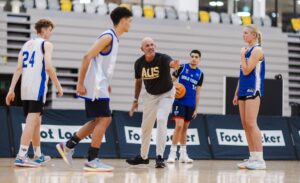The busy nature of the basketball calendar and the fact that many players and coaches are involved in multiple teams or programs at any one time makes efficiency on the practice court and in all realms of coaching crucial.
Limited practice time, the ongoing squeeze on court availability and inconsistent access to players mean the modern coach needs to find strategies to be efficient once the ball goes up at practice.
Link that with the desire and expectation of the modern player to be engaged and stimulated at all times and again, the pressure is on the leader to structure all aspects of the team with an eye to efficiency.
What are some strategies, in this instance, on the practice floor can be adopted to improve efficiency and make the most of precious practice time?
Be organised –
Most coaches will have a detailed practice plan and just as many will use the gym score clock to keep the practice on time and schedule. But organisation doesn’t start and end there.
Here are some ideas for an organised and efficient practice –
- Use “training grids” to be efficient with moving from drill to another (soccer coaches use this technique very well)
- Have the first three drills/activities of the session mapped out and set-up before you start. For example, warm-up at one basket, have the first ball handling drill set up ready to go at the other and cones out for a shooting drill all as the players hit the court
- Have assistant coaches or managers set-up/organise the next drill ahead of time or while the drill is functioning – don’t wait for the break and go into a mad scramble
- Every coach on floor with a ball under their arm and a towel on their shoulder to keep drills moving and the surface safe
- Coaches “corral” the court – spacing

“I repeat, don’t repeat” –
Efficiency of language and your words is every bit as important as the practice plan. Coaches traditionally are great “repeaters”, we tend to give even the most simple instruction multiple times.
Have a friend or coaching colleague count the number of times you repeat simple instructions or coaching cues in your next practice. Detail and clarity is important, multiple instructions on the simplest of drills not so much.
Linked to this, establish a common language for teaching skill and concept with assistant coaches to assist with clarity. Counsel assistant or basket coaches about avoiding re-teaching the drill or breakdown after the lead coach has set it up.
Valuable drill series for developing contested finishing, decision making both sides of the ball & help/recover concepts at this morning’s Women’s session pic.twitter.com/ydrncMBEux
— Centre of Excellence (@BACentreofExcel) November 10, 2023
Manage interventions –
No player enjoys when a drill is continually stopped for coaches to correct or “teach”. The ability to impact a drill without having to continually stop and interrupt is an important skill for coaches at all levels of the sport.
Work with assistant coaches to define when, how and why you as a staff will intervene once a drill is live and establish clarity around the impacting the flow of practice.
Another idea is to have a friend or coaching colleague count the number of interventions in your next practice. Take that number and discuss with assistant coaches how they felt the flow of the practice was. This is a small data-based way to track and measure the impact of your interventions.
Other thoughts on efficient practices –
- “Praise, prompt, leave” – apply this simple mantra to your teaching
- 6-8 minute training blocks where possible
- Don’t be a prisoner to the practice plan – be ok moving on
- Practice is not a coaching clinic – it’s about doing, not talking




Leave a Reply